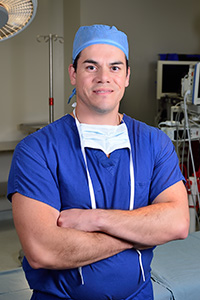John Sandoval
Photography by: Michael Clements
March 28, 2014

John Sandoval ('96) (Photo by Michael Clements)
During his time at UNT, John Sandoval ('96) conducted research, took sculpture classes and taught gymnastics to children -- all of which have played a role in his career as a doctor at one of the country's best-known hospitals.
Sandoval works as a pediatric surgeon and researcher at St. Jude's Children's Research Hospital in Memphis, Tenn., which is recognized for its cutting-edge cancer research and treatments. As a surgeon, he is able to see many aspects of a tumor, which helps guide his research.
"I like that I can operate and use my creativity in the lab," he says.
At UNT, he majored in biochemistry and biology and was a Ronald E. McNair Scholar. The McNair program offers undergraduates firsthand research experience and encourages first-generation or underrepresented students to prepare for doctoral study.
Through the program, he worked in the lab of Kent Chapman, Regents Professor of biochemistry, conducting research on lipid metabolism. Chapman says Sandoval was bright and not bashful about sharing his ideas, even though he was working with graduate students and postdoctoral scientists -- a setting that can be intimidating to undergraduates.
"John was a natural," Chapman says. "He had a knack for research -- good lab hands, as they say -- and a dedication to push ahead with the next experiments."
Sandoval completed a research thesis at UNT and became the first author on a publication from the research work he conducted in Chapman's lab -- "quite a rare and impressive achievement for an undergraduate," Chapman says.
And a minor in sculpture proved to be complementary toward his work.
"Performing surgery requires a perception of depth and the appreciation of three dimensional spaces," he says. "Before removing a large solid tumor, I go through the operation mentally and then visually anticipate the final outcome."
Sandoval also taught gymnastics to children at a Lewisville gym, giving him the experience of interacting with youngsters.
"Every age group was different with regard to capturing their attention," he says. "I still have to have a carefully planned approach not only for kids, but parents as well when we discuss surgery and cancer."
After he graduated from UNT, he earned his medical degree from Texas A&M Health Science Center. He then completed his general surgery residency in Indianapolis and obtained his subspecialty fellowship training in pediatric surgery in Denver before joining St. Jude's in 2010.
His research there focuses on neuroblastoma, a form of cancer specific to infants and young children that develops in nerve tissue and can arise from the neck, chest, abdomen or pelvis. He is working to find a fingerprint or biomarker in the blood to see if certain medications can be used to treat the cancer. Sandoval combines his research with conducting three to five operations a week. The work can be challenging when it comes to performing surgery on children.
"You're dealing with a very small environment," he says. "And you have to be very precise. There is no room for error."
His job also offers great opportunities.
"I think cancer doctors tend to be optimists," he says. "They may not always be able to save the child, but they can certainly offer hope. And the research makes that possible."